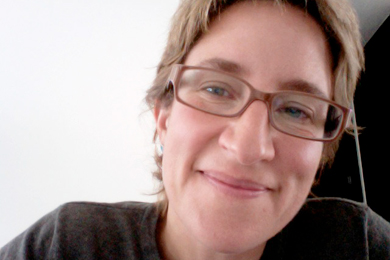Mexican journalist wins Pulitzer for Wal-Mart corruption exposé
- Details
- Published on Friday, 19 April 2013 12:58
- Written by Duncan Tucker
 In recognition of her work uncovering Wal-Mart’s corrupt practises in Mexico, Alejandra Xanic von Bertrab has become the first Mexican woman to be awarded the Pulitzer Prize for Investigative Reporting.
In recognition of her work uncovering Wal-Mart’s corrupt practises in Mexico, Alejandra Xanic von Bertrab has become the first Mexican woman to be awarded the Pulitzer Prize for Investigative Reporting.
Von Bertrab, 45, made her name as a journalist in Guadalajara in the early 1990s. On Monday she and colleague David Barstow learned that they will receive a 10,000-dollar award for their in-depth series for the New York Times, the first part of which was published in April 2012.
The investigation
“We started in May 2011 and continued working on the story for 19 months,” von Bertrab told the Reporter. Throughout this time, not even her closest friends knew what she was up to and even her father knew only the most basic of details.
Von Bertrab and Barstow’s investigation exposed how Wal-Mart employees had bribed Mexican officials as the chain began to expand south of the border in 2005. The pair unearthed evidence that Wal-Mart had made cash payments of up to 24 million dollars in order to obtain building permits and reductions in environmental impact fees.
Citing internal emails and Wal-Mart files, von Bertrab and Barstow also showed that top executives had sought to cover up evidence of these corrupt practises. They never received any threats or external pressure while working on the story, von Bertrab said, largely due to the fact that they “worked very silently, mostly by going through public records.”
Their reporting prompted an investigation by the Justice Department into whether Wal-Mart had violated the Foreign Corrupt Practices Act. It also led to an investigation by House Democrats Elijah Cummings and Henry Waxman, who warned Wal-Mart in August that freshly uncovered internal documents suggested the company “may have had compliance issues relating not only to bribery, but also to ‘questionable financial behavior’ including tax evasion and money laundering in Mexico.”
In a follow-up article printed in December, von Bertrab and Barstow documented how Wal-Mart, “an aggressive and creative corrupter,” had paid more than 200,000 dollars in bribes to build a store on protected land next to the Teotihuacan pyramids, a major tourist attraction near Mexico City.
Learning the trade
A tenacious reporter, von Bertrab learned her craft in Guadalajara, having moved here from Mexico City at the age of 14, and then studied communications at the private ITESO university.
She started out as a university radio host at the age of 18 and two or three years later began writing for the now-defunct local newspaper Siglo 21. As one of Siglo 21’s investigative reporters, von Bertrab worked on stories ranging from drug trafficking to state corruption and political assassinations.
Von Bertrab (she uses Alejandra Xanic as her byline) made her breakthrough in 1992, winning the National Journalism Award for her coverage of a series of underground gasoline explosions that tore up eight miles of streets in Guadalajara.
“She was living at home then and working at Siglo 21, which had just started. Only about four people started it and Xanic was one of them,” her father Guillermo von Bertrab, a resident of Guadalajara and parishoner of St. Mark’s Anglican Church, told the Reporter.
None of the other local dailies fully investigated the build-up of gas prior to the blasts, meaning the fledgling Siglo 21 was the only paper in Guadalajara to warn that this would lead to an explosion.
“I remember driving her to the Pemex installations so she could jump a wall to get in and see what was going on. Later I drove her to the newspaper. She and some technicians had guessed the danger before the explosion,” recounted her father. “The whole family was awake that night, especially Xanic, because she had to work on the story until 3 or 4 a.m., when the newspaper was printed. The story ran the headline ‘Va a explotar’ (It’s going to explode) and just after that, at 8 a.m. or so, it did.”
The blasts in the city’s sewer system left over 200 people dead, at least 500 injured and as many as 15,000 homeless. The event not only changed society, but it also sparked the rise of investigative journalism in Guadalajara, with Siglo 21 at the forefront.
“That story had a big impact on Siglo 21, which had only been running for four or five months at the time,” von Bertrab said. “We were seen as these young, naïve idealists, but we got so much publicity from the story and that gave us more weight.”
Investigative journalism
Von Bertrab continued working for the paper as it evolved into Publico (which was later bought by Milenio) and in 1996 she graduated with a master’s in international journalism at USC Annenberg in Los Angeles. She later moved to Mexico City to work for CNN’s business magazine Expansion and cover health and social issues as a freelancer for the likes of National Geographic, Milenio and Reforma.
Now an experienced professional, von Bertrab has developed an expertise in using the Freedom of Information Act that Mexico only passed in 2002 and she has become an active trainer of fellow reporters.
“Watchdog journalism is very, very important in Mexico,” she told the Reporter. “We have to be demanding with ourselves in terms of facts and the depth of reporting. We must be much more active in documenting corruption, but also in reporting on initiatives to change the country in a constructive manner.”
Having learned from her experience with the New York Times, von Bertrab is aware that journalists in Mexico need greater time and resources to produce more thorough investigative work.
“In the Mexican media, reporters often have to hand in three of four stories a day, meaning they can’t investigate or corroborate information,” she said. “We need more opportunities to produce investigative journalism. It would be great to be able to advance our stories, but we need better salaries and more support in the newsrooms in order to do more in-depth work.”
Citing her New York Times colleague Barstow as an inspiration – “he is a great editor and he was a humongous help to me” – von Bertrab said Mexican reporters need more high-quality editors who will support them and demand fewer, but better stories.
Well-earned plaudits
For now, she can take pride in being one of three Mexicans awarded a Pulitzer Prize this year. Leading the plaudits in the local press this week was El Informador columnist Diego Peterson, a former colleague of von Bertrab in Siglo 21.
Peterson recalled how in 1995, when the privatization of Mexico’s railways was announced, von Bertrab asked for unpaid leave to travel the country by rail. Determined to capture what was the end of an era for Mexico’s rail industry, she traveled as a stowaway aboard a freight train from the frontier with Guatemala to the U.S. border.
Her dedication to a story was unbounded, Peterson noted. Her “most admirable work” came when researching an article on the deaf, he said. For six months, von Bertrab devoted all her free time to learning sign language, just so that she could communicate with her subjects without using intermediaries.
“I want to congratulate her. There are very few journalists like her in Mexico,” another Siglo 21 colleague, former photo editor Jose Hernandez Claire, told the Reporter. Hernandez praised von Bertrab as “a very professional and charismatic woman who was very committed to journalism from the outset.”
Her father was equally glowing in his assessment of her work as a reporter. “She took some risks. She was very brave,” he said. “She has done beautiful work and she’s being praised for it. I’m very happy for her.”
Elaine Halleck also contributed to this story.

























 Proudly a member of Network of Websites - a monitored compilation of quality websites adhering to strict standards of integrity, security, modern technology, and benefits to the community.
Proudly a member of Network of Websites - a monitored compilation of quality websites adhering to strict standards of integrity, security, modern technology, and benefits to the community.